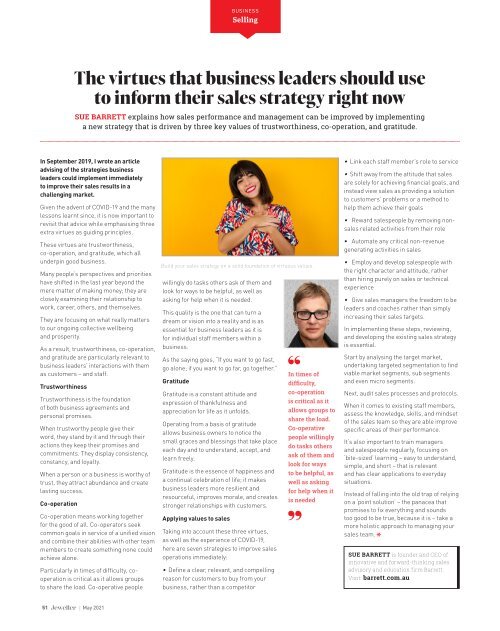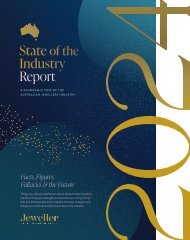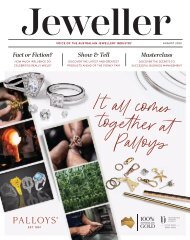Jeweller - May 2021
You also want an ePaper? Increase the reach of your titles
YUMPU automatically turns print PDFs into web optimized ePapers that Google loves.
BUSINESS<br />
Selling<br />
BUSINESS<br />
Management<br />
The virtues that business leaders should use<br />
to inform their sales strategy right now<br />
SUE BARRETT explains how sales performance and management can be improved by implementing<br />
a new strategy that is driven by three key values of trustworthiness, co-operation, and gratitude.<br />
Relying on gut instinct is not enough<br />
when building your retail strategy<br />
BRIAN WALKER explores the powers – and limitations – of intuition when<br />
it comes to managing a retail business and how experience interacts with data.<br />
In September 2019, I wrote an article<br />
advising of the strategies business<br />
leaders could implement immediately<br />
to improve their sales results in a<br />
challenging market.<br />
Given the advent of COVID-19 and the many<br />
lessons learnt since, it is now important to<br />
revisit that advice while emphasising three<br />
extra virtues as guiding principles.<br />
These virtues are trustworthiness,<br />
co-operation, and gratitude, which all<br />
underpin good business.<br />
Many people’s perspectives and priorities<br />
have shifted in the last year beyond the<br />
mere matter of making money; they are<br />
closely examining their relationship to<br />
work, career, others, and themselves.<br />
They are focusing on what really matters<br />
to our ongoing collective wellbeing<br />
and prosperity.<br />
As a result, trustworthiness, co-operation,<br />
and gratitude are particularly relevant to<br />
business leaders’ interactions with them<br />
as customers – and staff.<br />
Trustworthiness<br />
Trustworthiness is the foundation<br />
of both business agreements and<br />
personal promises.<br />
When trustworthy people give their<br />
word, they stand by it and through their<br />
actions they keep their promises and<br />
commitments. They display consistency,<br />
constancy, and loyalty.<br />
When a person or a business is worthy of<br />
trust, they attract abundance and create<br />
lasting success.<br />
Co-operation<br />
Co-operation means working together<br />
for the good of all. Co-operators seek<br />
common goals in service of a unified vision<br />
and combine their abilities with other team<br />
members to create something none could<br />
achieve alone.<br />
Particularly in times of difficulty, cooperation<br />
is critical as it allows groups<br />
to share the load. Co-operative people<br />
Build your sales strategy on a solid foundation of virtuous values.<br />
willingly do tasks others ask of them and<br />
look for ways to be helpful, as well as<br />
asking for help when it is needed.<br />
This quality is the one that can turn a<br />
dream or vision into a reality and is as<br />
essential for business leaders as it is<br />
for individual staff members within a<br />
business.<br />
As the saying goes, “If you want to go fast,<br />
go alone; if you want to go far, go together.”<br />
Gratitude<br />
Gratitude is a constant attitude and<br />
expression of thankfulness and<br />
appreciation for life as it unfolds.<br />
Operating from a basis of gratitude<br />
allows business owners to notice the<br />
small graces and blessings that take place<br />
each day and to understand, accept, and<br />
learn freely.<br />
Gratitude is the essence of happiness and<br />
a continual celebration of life; it makes<br />
business leaders more resilient and<br />
resourceful, improves morale, and creates<br />
stronger relationships with customers.<br />
Applying values to sales<br />
Taking into account these three virtues,<br />
as well as the experience of COVID-19,<br />
here are seven strategies to improve sales<br />
operations immediately:<br />
• Define a clear, relevant, and compelling<br />
reason for customers to buy from your<br />
business, rather than a competitor<br />
In times of<br />
difficulty,<br />
co-operation<br />
is critical as it<br />
allows groups to<br />
share the load.<br />
Co-operative<br />
people willingly<br />
do tasks others<br />
ask of them and<br />
look for ways<br />
to be helpful, as<br />
well as asking<br />
for help when it<br />
is needed<br />
• Link each staff member’s role to service<br />
• Shift away from the attitude that sales<br />
are solely for achieving financial goals, and<br />
instead view sales as providing a solution<br />
to customers’ problems or a method to<br />
help them achieve their goals<br />
• Reward salespeople by removing nonsales<br />
related activities from their role<br />
• Automate any critical non-revenue<br />
generating activities in sales<br />
• Employ and develop salespeople with<br />
the right character and attitude, rather<br />
than hiring purely on sales or technical<br />
experience<br />
• Give sales managers the freedom to be<br />
leaders and coaches rather than simply<br />
increasing their sales targets.<br />
In implementing these steps, reviewing,<br />
and developing the existing sales strategy<br />
is essential.<br />
Start by analysing the target market,<br />
undertaking targeted segmentation to find<br />
viable market segments, sub segments<br />
and even micro segments.<br />
Next, audit sales processes and protocols.<br />
When it comes to existing staff members,<br />
assess the knowledge, skills, and mindset<br />
of the sales team so they are able improve<br />
specific areas of their performance.<br />
It’s also important to train managers<br />
and salespeople regularly, focusing on<br />
‘bite-sized’ learning – easy to understand,<br />
simple, and short – that is relevant<br />
and has clear applications to everyday<br />
situations.<br />
Instead of falling into the old trap of relying<br />
on a ‘point solution’ – the panacea that<br />
promises to fix everything and sounds<br />
too good to be true, because it is – take a<br />
more holistic approach to managing your<br />
sales team.<br />
SUE BARRETT is founder and CEO of<br />
innovative and forward-thinking sales<br />
advisory and education firm Barrett.<br />
Visit: barrett.com.au<br />
The late economist, businessman, and<br />
governor of the US Federal Reserve<br />
Robert Heller had a saying, “Never<br />
ignore a gut feeling, but never believe<br />
that it’s enough.”<br />
Recently, I witnessed a senior retail<br />
business leader talking through their<br />
business’ strategy, its positioning and<br />
product deployment, describing how this<br />
had been conceived from the ‘gut’ – this<br />
individual’s intuition.<br />
In other words, it was their experience<br />
and instincts that led them to deliver such<br />
a well–crafted set of opinions, as well as<br />
the company’s operating strategy over a<br />
three–year timespan.<br />
The comment made me wonder about how<br />
reliable gut instinct really is in decisionmaking<br />
– and, in this retail business<br />
leader’s case, very important decisions!<br />
These decisions often require investment<br />
capital, intensive use of resources, and<br />
more often than not, radical approaches.<br />
How could a company’s board of directors<br />
endorse a strategy formed without<br />
independent insights, research and<br />
counterbalance? I wasn’t sure, although<br />
many have and still do.<br />
Over the years, retail CEOs have had to<br />
navigate a minefield of critical decisions;<br />
many of them ‘felt’ right, but were<br />
strategically flammable.<br />
Think of the department store that<br />
expanded its bricks-and-mortar presence<br />
when the world was fast discovering<br />
internet, or the retail group that spent too<br />
much on acquisitions of other businesses<br />
and exploded its balance sheet.<br />
Naturally, what comes next is to ask, in this<br />
rapidly changing landscape, how we can<br />
rely on our ‘gut’ to predict the future.<br />
Searching for a strategy<br />
In his book Intuition At Work, author<br />
Gary Klein expresses the common – and<br />
probably flawed – wisdom that intuition<br />
is “at the centre of the decision-making<br />
process” and that analysis is, at best,<br />
A decision may ‘feel’ right, but it can’t be made without a factual basis.<br />
“a supporting tool for making intuitive<br />
decisions.”<br />
Detached from rigorous analysis, intuition<br />
is a fickle and undependable guide; it is as<br />
likely to lead to disaster as to success.<br />
And while some have argued that intuition<br />
becomes more valuable in highly complex<br />
and changeable environments, the<br />
opposite is actually true.<br />
Making great decisions ‘from the gut’ has<br />
been emblematic of leaders in the past<br />
– there are business fables assigned to<br />
these moments – yet the reality is that they<br />
are very much few and far between.<br />
In fact, exceptional instinct is a superpower<br />
that only superheroes truly possess.<br />
As Ralph Lauren, former CEO<br />
of international pharmaceutical<br />
conglomerate Johnson & Johnson, said,<br />
“Very often, people will do a brilliant job up<br />
through the middle management levels,<br />
where it’s very heavily quantitative in terms<br />
of the decision-making.<br />
“But then they reach senior management,<br />
where the problems get more complex<br />
and ambiguous, and we discover that<br />
their judgment or intuition is not what it<br />
should be.”<br />
Complexity and ambiguity are absolutely<br />
the hallmarks of the environment we live in<br />
today, and the human brain is “wired to see<br />
patterns in the information our senses take<br />
The reason<br />
successful,<br />
creative<br />
entrepreneurs,<br />
particularly<br />
those that have<br />
been in their<br />
industries for a<br />
long time, are<br />
often known<br />
to have great<br />
instincts is<br />
because they<br />
simply have a<br />
deeper well of<br />
experience to<br />
draw from<br />
in,” explains US biology professor<br />
Jeanne Hardy.<br />
Hardy observes that most of this takes<br />
place in the subconscious, which forms<br />
“95 per cent of our brain activity”.<br />
“When we subconsciously process<br />
patterns, our body produces<br />
neurochemicals that trigger both the<br />
brain and gut. This is how our intuition is<br />
formed and why we get the sensation that<br />
something ‘feels’ right or wrong,” she says.<br />
According to Hardy, intuition is formed<br />
from two aspects – current senses, or<br />
the information our brain is processing<br />
when the ‘gut feeling’ kicks in, as well as<br />
memories stored in the brain.<br />
She posits that the reason successful,<br />
creative entrepreneurs, particularly those<br />
that have been in their industries for a<br />
long time, are often known to have great<br />
instincts is because they simply have a<br />
deeper well of experience to draw from.<br />
This sums up determining the role of<br />
the ‘limbic’ – or instinctive – approach to<br />
strategy formation and the insights that<br />
years of experience bring to the table.<br />
Similarly, on the consumer side, intuition<br />
isn’t just a random collection of feelings<br />
that happen when you’re exposed to a<br />
particular product or brand.<br />
Often, these emotional responses are<br />
informed by previous experiences, ideas,<br />
and memories.<br />
In summary, a seasoned executive who<br />
has worked in the same sector for many<br />
years, and has therefore acquired ingrained<br />
learnings, experiences and relevant<br />
thinking, can largely rely on their instincts –<br />
so long as this is supported by data.<br />
Trust me, I have an intuition for these<br />
matters!<br />
BRIAN WALKER is the founder and<br />
managing director of Retail Doctor<br />
Group, a retail consulting company.<br />
Visit: retaildoctor.com.au<br />
51 | <strong>May</strong> <strong>2021</strong><br />
<strong>May</strong> <strong>2021</strong> | 52


















